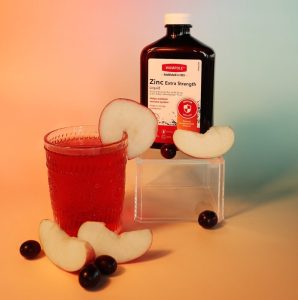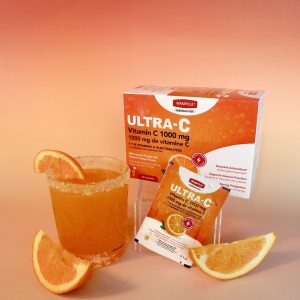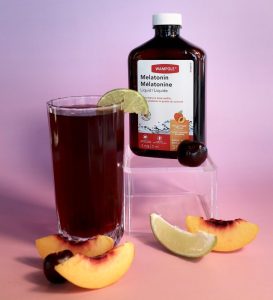Tips for maintaining optimal levels of vitamin D in both winter and summer
Vitamin D is crucial to our well-being and influences multiple aspects of our health.
Our bodies possess the unique ability to produce it when a sizable area of our skin is directly exposed to sunlight. But sun exposure and diet are not always enough for us to meet our needs, especially during the winter months.
In this article, we’ll explain the importance of vitamin D and the various ways of making sure you get enough of it all year round.
Why vitamin D is important
Vitamin D is a nutrient that plays a key role in our health, notably for bone strength, since it promotes the absorption of calcium, a mineral that’s essential to bone formation and fracture prevention.
In addition to its benefits for healthy bones, vitamin D also plays a significant role in immune function, helping strengthen the body’s defences, which is essential for fighting infections.
Hormone regulation and blood clotting are other aspects of human physiology in which vitamin D plays a role.
Vitamin D during the winter
In winter, our bodies may not produce enough vitamin D because of a lack of sun exposure. UVB rays are less intense during the colder months, especially in regions farther from the equator like Canada, and this means the skin doesn’t synthesize vitamin D as efficiently.
The risk of vitamin D deficiency is greater for people who don’t spend much time in the sun, for older people, and for people who have certain diseases that affect how their bodies absorb vitamins and minerals.
Vitamin D during the summer
In the summer, even though there’s more sunlight, you may still develop a vitamin D deficiency if you tend to limit your sun exposure.
Here’s an interesting fact: people with darker skin have greater amounts of melanin in their skin, which affects their capacity to produce vitamin D, in turn putting them at increased risk for deficiency.
Good to know
The skin produces the most vitamin D around midday. However, applying sunscreen and covering up with clothing can mean your skin produces less of the vitamin.
Spending a lot of time indoors on sunny days, whether it’s for work, school or other reasons, can limit sun exposure and, in turn, vitamin D synthesis.
Important
Always remember that, despite the sun’s role in vitamin D synthesis, you should never stop using sunscreen.
Foods rich in vitamin D
Although our bodies generate vitamin D through sun exposure, there are also some foods that are excellent sources.
Oily fish such as salmon and rainbow trout are especially rich in vitamin D, and can contribute to the recommended daily intake. Fortified milk is another good source of vitamin D, and so are eggs, especially the yolks.
Vitamin D supplements
In some situations, your intake of vitamin D from sunlight and foods may not be sufficient. This is where vitamin D supplements come in, as an attractive option to fill the gap and reduce the risk of a deficiency.
For example, people with dietary restrictions, including strict vegans who eat no meat, fish, eggs or dairy products, may have difficulty getting enough vitamin D from diet alone.
The differences between vitamin D2 and vitamin D3
When choosing a vitamin D supplement, vitamin D3 (cholecalciferol) is often preferred over vitamin D2 (ergocalciferol).
Vitamin D3 is the kind that our bodies synthesize when our skin is exposed to sunlight, while vitamin D2 is sourced from plants.
Recommended daily intake
People’s recommended vitamin D intake varies according to their age, weight and overall health. It’s best to consult a health professional to find out the right dosage for your needs.
That said, Health Canada offers the following guidelines to help meet your individual needs:
If you are between 2 and 50 years old:
- Eat foods containing vitamin D every day; OR
- Take a daily supplement that contains 400 international units (IU), or 10 micrograms (µg), of vitamin D.
If you are 51 or older:
- Take a daily supplement that contains 400 IU (10 µg) of vitamin D;
- Eat foods containing vitamin D as part of healthy eating habits.
The various kinds of vitamin D supplements
Vitamin D supplements come in many different delivery forms, each of which has its benefits.
Pills, hard capsules and soft capsules
- Deliver the active ingredients in concentrated form (fewer excipients).
- Hide the possible bad taste of the active ingredients.
Chewable tablets
- Are easy to take, especially for people who have trouble swallowing pills, hard capsules and soft capsules.
- Have a long shelf life.
Gummies
- Tend to taste good, as they are sometimes sweetened with natural flavours.
- Are easier to consume for people who don’t like pills, hard capsules and soft capsules.
Liquids
- Are rapidly absorbed into the body.
- Offer flexible doses.
Each supplement form has its particular benefits, which may be a better fit for some individual needs or preferences. It’s important to consider these factors when choosing a supplement, and to consult a health professional for personalized advice.
Adorable and Wampole vitamin D supplements
The Adorable and Wampole lines of vitamin D supplements are designed to meet the needs of different age groups, with specific formulations to help ensure the recommended daily intake of this vitamin.
Adorable Vitamin D for children
Vitamin D Drops 1000 IU
Adorable Vitamin D Drops 1000 IU are specially formulated to help children aged 1 and older get their recommended levels of vitamin D. They aid in the development and maintenance of bones and teeth, and are easy to administer.
Vitamin D Drops 400 IU
Suitable for daily use right from birth, lower-dose Adorable Vitamin D Drops 400 IU help maintain the recommended levels of vitamin D in young, growing children, in turn helping maintain immune function.
Vitamin D Immunity Tablets 1000 IU
Adorable Vitamin D Immunity Tablets 1000 IU are specially designed for children aged 3 and up. They help support immune function, and are formulated without artificial flavours or colours, preservatives or gelatine.
Black Elderberry + Vitamin D Immunity Syrup
Black Elderberry + Vitamin D Immunity Syrup combines the anti-oxidant benefits of elderberries with the benefits of vitamin D. Its Vitamin D content provides immune support for children aged 2 and older, and also helps relieve cold and flu symptoms.
Wampole vitamin D for adults
Vitamin D Liquid 1000 IU
Wampole Vitamin D Liquid 1000 IU is perfect for anyone looking for an alternative to taking pills. It contains the natural D3 form of vitamin D, and helps the body absorb and use calcium and phosphorus.
Vitamin D3 1000 Units
Wampole Vitamin D3 1000 Units comes in easy-to-swallow tablets containing the animal-sourced D3 form of vitamin D. It too helps the body absorb and use calcium and phosphorus.
Vitamin C+D Grape Chewable
Wampole Vitamin C+D Chewable provides an immune-boosting combination of vitamins. Each tablet supplies 500 mg of vitamin C and 1000 IU of vitamin D, in a naturally grape-flavoured chewable format.
Radiant health thanks to vitamin D
Ensuring your recommended daily intake of vitamin D is important for your health, no matter what the season. Adorable vitamin D supplements for children and Wampole supplements for adults offer convenient, personalized solutions to maintain vitamin D intake for everyone in the family, from young to old.
Always check the label for specific instructions and restrictions, which may vary from product to product, to ensure correct and safe use.
___________________
References:
- National Institutes of Health, https://ods.od.nih.gov/factsheets/VitaminD-HealthProfessional/
- La Nutrition, Sarah Amiri, https://www.lanutrition.fr/bien-dans-son-assiette/les-nutriments/vitamines/vitamine-d
- Medisite, https://www.medisite.fr/sante-a-z-la-vitamine-d-roles-et-principaux-bienfaits.5620718.917571.html
- Doctonat, https://doctonat.com/vitamine-d-bienfaits-vertus/
- National Institutes of Health, https://ods.od.nih.gov/factsheets/VitaminD-HealthProfessional/
- Familiprix, https://www.familiprix.com/en/articles/should-you-take-vitamin-d-supplements-in-the-winter
- American Academy of Dermatology Association, https://www.aad.org/media/stats-vitamin-d
- Vitamine D, https://www.vitamined.net/vitamine-d-en-ete/
- Health Canada, https://www.canada.ca/en/health-canada/services/nutrients/vitamin-d.html
- Laboratoire Lescuyer, https://www.laboratoire-lescuyer.com/blog/nos-conseils-sante/le-top-20-des-aliments-riches-en-vitamine-d
- Mium Lab, Jennifer Allouche, https://www.miumlab.com/blogs/conseils-sante/confinement-comment-assurer-un-apport-suffisant-en-vitamine-d-1
- Passport Santé, https://www.passeportsante.net/fr/Solutions/PlantesSupplements/Fiche.aspx?doc=vitamine_d_ps
- Verywell Health, Lindsay Curtis, Elizabeth Barnes, https://www.verywellhealth.com/vitamin-d-vs-d3-7153133
- Verywell Health, Lindsay Curtis, Elizabeth Barnes, https://www.verywellhealth.com/vitamin-d-vs-d3-7153133
- Health Canada, https://www.canada.ca/en/health-canada/services/nutrients/vitamin-d.html
- Ask the Scientists, https://askthescientists.com/qa/why-does-usana-prefer-tablets-over-liquids/
- WebMD, WebMD Editorial Contributors and Dan Brennan, MD, https://www.webmd.com/healthy-aging/what-to-know-about-liquid-vitamins-after-60









